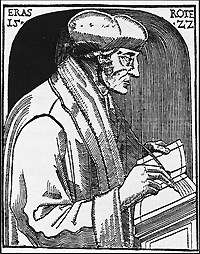Paracelsus
While still a youth Paracelsus became aware of many of the conflicting currents of his age. His father was a physician in Einsiedeln and he practiced in a number of mining towns. The boy surely learned some practical medicine at home through observing his father. It is likely that he learned some folk medicine as well. He also picked up some alchemy from his father who had an interest in the subject. And in mining towns he would have observed metallurgical practices as well as the diseases that afflicted the men who worked the mines. Traditionally it has been said that Paracelsus was taught by several bishops and the occultist abbot of Sponheim, Johannes Trithemius. At the age of fourteen the boy left home to begin a long period of wandering. He apparently visited a number of universities, but there is no proof that he ever took a medical degree. As an adult, however, he picked up practical medical knowledge by working as a surgeon in a number of the mercenary armies that ravaged Europe in the seemingly endless wars of the period. He wrote that he visited most of the countries of Central, Northern, and Eastern Europe.
It is only in the final fifteen years of his life that the records of his travels become clearer. In 1527 he was called to Basel to treat a leg ailment of the famed publisher of humanist classics, Johannes Frobenius. In Basel Paracelsus also gave medical advice to the Dutch scholar Erasmus and came in contact with some of the more prominent scholars of the religious Reformation. He was appointed city physician and professor of medicine. But although he was permitted to lecture at the University of Basel, he had no official appointment with the medical faculty there.
Almost immediately Paracelsus became a figure of contention. He heaped scorn on the conservative physicians of the University, and, at the St. John's Day bonfire, threw Avicenna's revered Canon of medicine to the blaze. Then, his patient, Frobenius, died. This was followed by a disastrous lawsuit and he left Basel in haste, even leaving behind his manuscripts.
The final years of his life find Paracelsus moving from town to town, and again, he often left his manuscripts behind as he had in Basel. He comes across as an angry man who antagonized many of those he met -- even those who tried to help him. In the end he was called to Salzburg to treat the suffragan bishop, Ernest of Wittelsbach. There he died at the early age of forty-eight.


